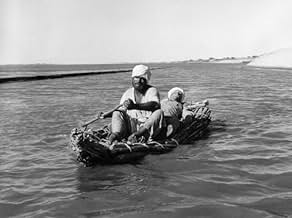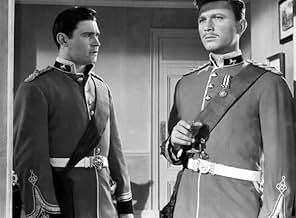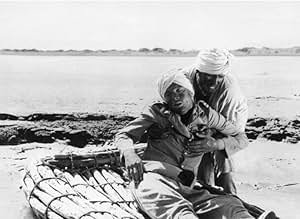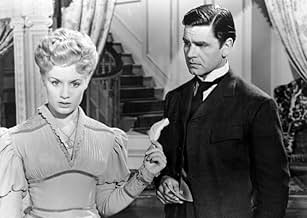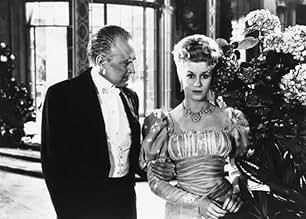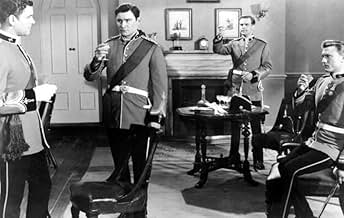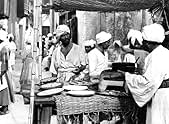NOTE IMDb
6,1/10
706
MA NOTE
Un officier britannique qui ne se sent guère de dispositions pour le métier des armes auquel l'a poussé son père est accusé de lâcheté par trois de ses amis et par la jeune fille qu'il aime.... Tout lireUn officier britannique qui ne se sent guère de dispositions pour le métier des armes auquel l'a poussé son père est accusé de lâcheté par trois de ses amis et par la jeune fille qu'il aime. Il entreprend alors de leur prouver son courage.Un officier britannique qui ne se sent guère de dispositions pour le métier des armes auquel l'a poussé son père est accusé de lâcheté par trois de ses amis et par la jeune fille qu'il aime. Il entreprend alors de leur prouver son courage.
- Réalisation
- Scénario
- Casting principal
Avis à la une
Although you wouldn't guess it from the title, Storm Over the Nile is a version of Four Feathers. This is the fourth film version I have seen, and it is quite good, with only one problem: Laurence Harvey is not the hero, and he is far too likeable. In the other versions, the leading actor is the likable one, so you are able to easily root for him to win back the affections of his fiancé and live happily ever after. In this one, though, Anthony Steel is the lead. He is not unlikable on his own, but Laurence Harvey's performance is very sensitive and sweet, and you can't help but like him better. You hope that he is the one who can win back affections of Mary Ure and live happily ever after. Even though the story clearly revolves around Anthony's quest for honor, Larry is the one you care about.
Besides that, it's a solid period drama. The music tries to evoke Miklos Rozsa's original themes, and Zoltan Korda's direction reminds us how well he directed the earlier 1939 version. If the casting were reversed, it probably would have been a very good movie. Love Larry in this? Check him out in The Alamo or Walk on the Wild Side.
Besides that, it's a solid period drama. The music tries to evoke Miklos Rozsa's original themes, and Zoltan Korda's direction reminds us how well he directed the earlier 1939 version. If the casting were reversed, it probably would have been a very good movie. Love Larry in this? Check him out in The Alamo or Walk on the Wild Side.
If the name The Sudan is familiar today it is probably on account of the constant references to the exploits of his youth by Jonesy in 'Dad's Army' of the time he spent engaging the Mad Mahdi, briefly seen played by John Laurie in footage from the 1939 version.
Here you get a chance to see the thing played straight in this CinemaScope remake by Zoltan Korda of his classic thirties Ripping Yarn back in the days when Britain still had an empire.
Anthony Steel is a colourless substitute for John Clements as Harry Faversham and the less said about Lawrence Harvey in the role originally played by Ralph Richardson the better; but the late Mary Ure makes a charming and gracious heroine, while Osmond Borradaile's original location footage continued to give good value in this and a subsequent seventies version.
Here you get a chance to see the thing played straight in this CinemaScope remake by Zoltan Korda of his classic thirties Ripping Yarn back in the days when Britain still had an empire.
Anthony Steel is a colourless substitute for John Clements as Harry Faversham and the less said about Lawrence Harvey in the role originally played by Ralph Richardson the better; but the late Mary Ure makes a charming and gracious heroine, while Osmond Borradaile's original location footage continued to give good value in this and a subsequent seventies version.
If you're going to clone something in Hollywood, clone something good which is what Storm Over The Nile is. It is yet another remake of the famous novel The Four Feathers. The same treatment was afforded Dawn Patrol by Warner Brothers back in the Thirties when the first version with Douglas Fairbanks, Jr. was cloned into the second with Errol Flynn.
The script from the classic British production from 1939 was used as well as all the battle sequences. That was a wise thing because in 1939 the British controlled the Sudan and were able to film their action sequences on the very spot where these things occurred back in the late 19th century. Not to mention that it certainly saved big time on the budget.
Anthony Steel plays our protagonist Harry Fevasham who questions his own courage when he's about to be shipped into action in the Sudan. Steel is from a military family and there are reasons of tradition and obligations that force him into that life. His brother officers brand him a coward and send him a white feather as the symbol of same.
Some time later Steel goes to the Sudan and lives as an Arab tribesman and in that role performs some truly heroic feats. Best as always is his saving Laurence Harvey who is one of his accusers who is now blind as a result of prolonged exposure to the desert sun. Harvey's role was done in 1939 by Ralph Richardson.
James Robertson Justice is also in the cast playing a really good John Bull type character. He's the father of Mary Ure who was supposed to marry Steel before his resignation and the feathers. JRJ always adds a lot to any film he's ever in.
The Four Feathers with its story about a man questioning his courage and finding out truly if he has the right stuff is in the British culture very much akin to The Red Badge Of Courage. That has only had one film adaption whereas The Four Feathers has had many. Beau Bridges did one in the Seventies and the late Heath Ledger starred as Harry Fevasham in the latest screen version.
But only the 1939 and 1955 can boast actual on scene location shooting. And unless the Sudan changes radically were not likely to see another.
The script from the classic British production from 1939 was used as well as all the battle sequences. That was a wise thing because in 1939 the British controlled the Sudan and were able to film their action sequences on the very spot where these things occurred back in the late 19th century. Not to mention that it certainly saved big time on the budget.
Anthony Steel plays our protagonist Harry Fevasham who questions his own courage when he's about to be shipped into action in the Sudan. Steel is from a military family and there are reasons of tradition and obligations that force him into that life. His brother officers brand him a coward and send him a white feather as the symbol of same.
Some time later Steel goes to the Sudan and lives as an Arab tribesman and in that role performs some truly heroic feats. Best as always is his saving Laurence Harvey who is one of his accusers who is now blind as a result of prolonged exposure to the desert sun. Harvey's role was done in 1939 by Ralph Richardson.
James Robertson Justice is also in the cast playing a really good John Bull type character. He's the father of Mary Ure who was supposed to marry Steel before his resignation and the feathers. JRJ always adds a lot to any film he's ever in.
The Four Feathers with its story about a man questioning his courage and finding out truly if he has the right stuff is in the British culture very much akin to The Red Badge Of Courage. That has only had one film adaption whereas The Four Feathers has had many. Beau Bridges did one in the Seventies and the late Heath Ledger starred as Harry Fevasham in the latest screen version.
But only the 1939 and 1955 can boast actual on scene location shooting. And unless the Sudan changes radically were not likely to see another.
Being something of a pacifist, Harry Faversham (Anthony Steele) has the misfortune to be born into a staunchly military family with all the expectations of an overbearing father (Michael Hordern) weighing down on his shoulders. Harry toes the line to please his dad, but when the old boy pops his clogs, he swiftly resigns his commission. As a consequence, he receives a white feather (the symbol of cowardice) from each of his best friends (Laurence Harvey, Ronald Lewis, and an out-of-place Ian Carmichael) on the eve of their departure to war in the Sudan. Harry awards himself a symbolic feather on behalf of his fiancée (Mary Ure) whose disappointment is clear. Harry determines to make his former friends take back their feathers, which is the signal for much derring-do to begin (hurrah!).
The tale of the four feathers is the epitome of the schoolboy adventure yarn with heroic soldiers blinded in battle, heroic soldiers captured by the fuzzie-wuzzies (not nice, I can tell you!), heroic cowards braving forehead-branding and boot polish to go deep under cover in darkest Africa, and pompous old boors endlessly recounting their role in the battle of Balaclava back in the Crimean. It should really be boredom-proof, but the sad truth is that this version comes perilously close to inducing that state at times. The film is practically a word-for-word remake of the 1939 version – and even makes scandalously wholesale use of the earlier version's battle scenes – which means it probably came across as a bit staid back in 1955, but looks positively creaky today.
Anthony Steel isn't a particularly convincing hero: at thirty-five he's playing a twenty-five year old who somehow looks forty-five, but the problem is more in the lack of sympathy Steel creates for his character. His Harry Faversham is the sort that sits in the corner and speaks when he's spoken too, and is therefore a little too bland to be a dashing hero, despite his acts of heroism. And exactly what sort of reaction did he expect to receive when he resigned his commission? Doesn't trotting off to the desert to regain his honour in the eyes of his friends and fiancée simply negate the strength of character required to resign in the first place? A young Laurence Harvey fares better as Faversham's upper-crust chum who suffers sun blindness when hiding from the fuzzies, and would arguably have been better suited to the leading man role. Ronald Lewis has practically nothing to do, while Ian Carmichael, on the cusp of his comedy career, comes off as a plummy-voiced twit.
The film isn't awful by any standards, but it really could have benefited from fifteen minutes being pruned from its running time, and a little more fire in young Faversham's belly.
The tale of the four feathers is the epitome of the schoolboy adventure yarn with heroic soldiers blinded in battle, heroic soldiers captured by the fuzzie-wuzzies (not nice, I can tell you!), heroic cowards braving forehead-branding and boot polish to go deep under cover in darkest Africa, and pompous old boors endlessly recounting their role in the battle of Balaclava back in the Crimean. It should really be boredom-proof, but the sad truth is that this version comes perilously close to inducing that state at times. The film is practically a word-for-word remake of the 1939 version – and even makes scandalously wholesale use of the earlier version's battle scenes – which means it probably came across as a bit staid back in 1955, but looks positively creaky today.
Anthony Steel isn't a particularly convincing hero: at thirty-five he's playing a twenty-five year old who somehow looks forty-five, but the problem is more in the lack of sympathy Steel creates for his character. His Harry Faversham is the sort that sits in the corner and speaks when he's spoken too, and is therefore a little too bland to be a dashing hero, despite his acts of heroism. And exactly what sort of reaction did he expect to receive when he resigned his commission? Doesn't trotting off to the desert to regain his honour in the eyes of his friends and fiancée simply negate the strength of character required to resign in the first place? A young Laurence Harvey fares better as Faversham's upper-crust chum who suffers sun blindness when hiding from the fuzzies, and would arguably have been better suited to the leading man role. Ronald Lewis has practically nothing to do, while Ian Carmichael, on the cusp of his comedy career, comes off as a plummy-voiced twit.
The film isn't awful by any standards, but it really could have benefited from fifteen minutes being pruned from its running time, and a little more fire in young Faversham's belly.
One Sunday afternoon in 1982 BBC 1 broadcast STORM OVER THE NILE . Nothing remarkable in itself with this scheduling but later that evening the ITV channel broadcast THE FOUR FEATHERS remake from the late 1970s ! Two different versions of the same story broadcast a few hours within each other on the two network channels ! Amazing , and not something that was unnoticed since myself and several school colleagues remarked upon this the next day . We were all in unanimous agreement that STORM OVER THE NILE was the much superior movie . Strangely over the years every time Terence Young's version is broadcast the TV guides don't have kind words for the 1955 film version of AEW Mason's story and after seeing the original 1939 version of THE FOUR FEATHERS I understand why - It's a rip off !
In the past I have criticised movies like CRITICAL MASS and RANGERS that use extensive film footage from other movies like TERMINATOR 2 and NAVY SEALS . With STORM we see the exact same thing . The truly great battle scenes weren't directed by Young they were directed by Zoltan Korda almost 20 years earlier . To be fair I don't think the producers are claiming that this is an entirely original movie hence the credit for both Korda and Young in the directors slot but I did see the 1939 version a week earlier on channel 4 and this spoils the enjoyment of STORM since the script is identical as are most of the action scenes . If you've never seen the original you'll like this movie but if you remember the unforgettable 1939 version by the Korda brothers you'll be left with a cynical feeling watching this
In the past I have criticised movies like CRITICAL MASS and RANGERS that use extensive film footage from other movies like TERMINATOR 2 and NAVY SEALS . With STORM we see the exact same thing . The truly great battle scenes weren't directed by Young they were directed by Zoltan Korda almost 20 years earlier . To be fair I don't think the producers are claiming that this is an entirely original movie hence the credit for both Korda and Young in the directors slot but I did see the 1939 version a week earlier on channel 4 and this spoils the enjoyment of STORM since the script is identical as are most of the action scenes . If you've never seen the original you'll like this movie but if you remember the unforgettable 1939 version by the Korda brothers you'll be left with a cynical feeling watching this
Le saviez-vous
- AnecdotesRe-used a great deal of stock footage from Les quatre plumes blanches (1939), including the entire final battle sequence.
- GaffesHooded vultures are shown making many and various calls. The species, in common with other Old World vultures, is largely silent.
- Crédits fousOpening credits prologue: In 1885 the rebellious army of dervishes enslaved and killed many thousands of defenceless natives in the Sudan. Then laid siege to Khartoum. The scanty garrison's heroic commander, General Gordon appealed for help from England - but no help reached him.
- ConnexionsEdited from Les quatre plumes blanches (1939)
Meilleurs choix
Connectez-vous pour évaluer et suivre la liste de favoris afin de recevoir des recommandations personnalisées
- How long is Storm Over the Nile?Alimenté par Alexa
Détails
- Date de sortie
- Pays d’origine
- Langue
- Aussi connu sous le nom de
- Zoltan Korda's Production Storm Over the Nile
- Lieux de tournage
- Sociétés de production
- Voir plus de crédits d'entreprise sur IMDbPro
- Durée1 heure 47 minutes
- Rapport de forme
- 2.55 : 1
Contribuer à cette page
Suggérer une modification ou ajouter du contenu manquant

Lacune principale
By what name was Les 4 plumes blanches (1955) officially released in India in English?
Répondre
